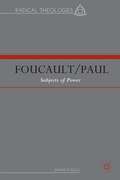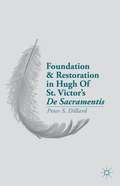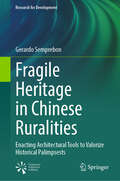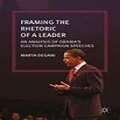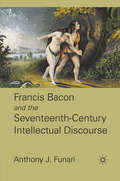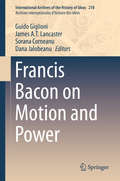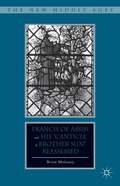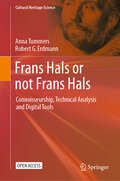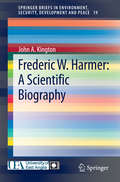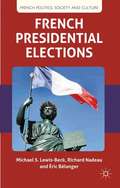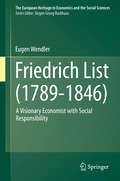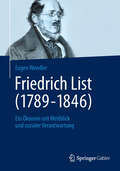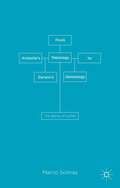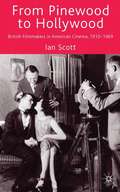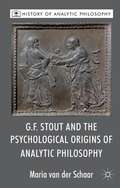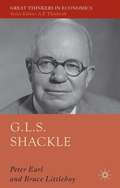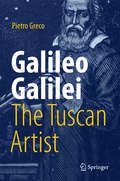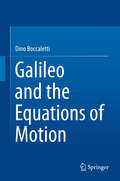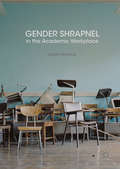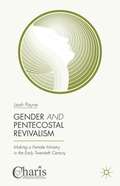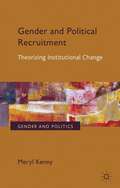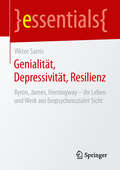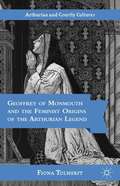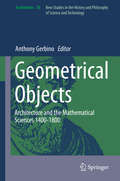- Table View
- List View
Foucault/paul
by Sophie FuggleWhat is power? Where does it come from and who is in possession of it? How should we think about power and authority in a post-secular society in which traditional boundaries between individual and collective faith and secular governments and institutions are becoming increasingly blurred? The way which we conceive of power in the twenty-first century will effectively determine how we approach issues such as market reform and environmental disaster. Placing the twentieth-century French philosopher Michel Foucault into critical conjunction with the apostle Paul, Foucault/Paul re-evaluates the way in which power operates within society and underpins our ethical and political actions.
Foundation And Restoration In Hugh Of St. Victor’s De Sacramentis
by Peter S. DillardTaking Hugh of St. Victor's magisterial On the Sacraments of the Christian Faith as his source text, Dillard applies the methods of analytic philosophy to develop a systematic theology in the spirit of Christian Platonism. Themes examined include the existence of God, creation ex nihilo, modality and causality, divine immutability and eternity, divine exemplarity, sin, dualism, personhood, evil, ecclesiology, and resurrection, and beatitude. Throughout his rigorous study, Dillard underscores the importance of Hugh's theological anthropocentrism, rationalism, sacramental realism, and pragmatism. Hugh's highly original views are placed in their proper historical context and also related to contemporary concerns. The fascinating questions that Dillard explores remain pressing for readers interested in philosophy, theology, religion, and the history of medieval thought.
Fragile Heritage in Chinese Ruralities: Enacting Architectural Tools to Valorize Historical Palimpsests (Research for Development)
by Gerardo SemprebonThis book explores the concept of fragile heritage as an architectural legacy and a territorial resource in rural China, emphasizing the significance in safeguarding its unique cultural trajectory, and laying the groundwork for future developments. Chinese rural buildings and settlements encapsulate priceless cultural values, but become increasingly vulnerable, under increasing pressures. Socioeconomic transitions, climate change, political agendas, land rent speculation, awakenings, and commodifications of cultural values, redefine the conceptual and operational framework of countryside transformation, and contribute to the debate on contemporary architectural and urban design. In this context, rural authenticity emerges as a crucial value in architectural morpho-typology, construction techniques, and expressive codes. The book introduces the notion of fragile heritage as the crossroad between folklore, academia, and practice. Next, it put in place reading methods to frame rural settlements as cultural palimpsests, indissolubly tying architectures to the landscape. These concepts are then applied to a multiscalar analysis of fifteen traditional architectures to uncover rural space and society's physical and cultural dimensions. Finally, it discusses recent revitalization projects, highlighting the potential role of architectural design. The research methodology relies on fieldwork campaigns in the Fujian and Zhejiang Provinces of China between 2017 and 2019 and a subsequent critical ri-elaboration that leverages the graphic apparatus as the fundamental investigative tool. The central idea put forward in this book is that, between tradition and innovation, the fragile heritage of past societies needs a cultural translation, interpretation, and negotiation to find space and life in the contemporary milieu.
Framing the Rhetoric of a Leader
by Marta DeganiBased on a selection of 30 election campaign speeches during Obama's first run for the American presidency in 2008, this book investigates the Democratic presidential candidate's much celebrated rhetoric from a cognitive semantics point of view.
Francis Bacon and the Seventeenth-Century Intellectual Discourse
by Anthony J. FunariThis book explores the resistance of three English poets to Francis Bacon's project to restore humanity to Adamic mastery over nature, moving beyond a discussion of the tension between Bacon and these poetic voices to suggest theywere also debating the narrative of humanity's intellectual path.
Francis Bacon on Motion and Power
by Sorana Corneanu Guido Giglioni James A.T. Lancaster Dana JalobeanuThis book offers a comprehensive and unitary study of the philosophy of Francis Bacon, with special emphasis on the medical, ethical and political aspects of his thought. It presents an original interpretation focused on the material conditions of nature and human life. In particular, coverage in the book is organized around the unifying theme of Bacon's notion of appetite, which is considered in its natural, ethical, medical and political meanings. The book redefines the notions of experience and experiment in Bacon's philosophy of nature, shows the important presence of Stoic themes in his work as well as provides an original discussion of the relationships between natural magic, prudence and political realism in his philosophy. Bringing together scholarly expertise from the history of philosophy, the history of science and the history of literature, this book presents readers with a rich and diverse contextualization of Bacon's philosophy.
Francis Of Assisi And His "canticle Of Brother Sun" Reassessed
by Brian MoloneyBringing the skills of a literary historian to the subject, Brian Moloney considers the genesis of Saint Francis of Assisi's Canticle of Brother Sun to show how it works as a carefully composed work of art. The study examines the saint's life and times, the structure of the poem, the features of its style, and the range of its possible meanings.
Frans Hals or not Frans Hals: Connoisseurship, Technical Analysis and Digital Tools (Cultural Heritage Science)
by Anna Tummers Robert G. ErdmannFrans Hals is hailed as one of the three greatest painters of the Dutch seventeenth century along with Rembrandt and Vermeer. Of all seventeenth-century Dutch painters, Frans Hals is also the most controversial in as far as the exact scope of his oeuvre is concerned. Hals’s popularity, the lack of technical reference material as well as the differing views among experts as to the exact scope of his oeuvre make works in his style prone to doubts and misattributions. It has led to fierce debates and legal battles about the attribution of paintings done in his style. In this Open Access book, experts from Ghent University, Leiden University, Amsterdam University, Delft University of Technology, the Frans Hals Museum (Haarlem), the Rijksmuseum (Amsterdam), the Gemäldegalerie (Berlin) and the Metropolitan Museum of Art (New York) give surprising new insights into some of Hals’s most well-known paintings as well as into some of the most fiercely contested pictures in his style. Their insights result from in-depth study of a wealth of reference material: seventeenth-century sources, advanced technical analyses and newly developed digital visualisation tools. “Tummers and Erdmann have produced a work of ground-breaking new scholarship. They combine in-depth art historical study with new technical analyses and data visualisation tools in order to solve current issues in the attribution of paintings by Frans Hals. This book significantly sharpens our understanding of Hals’s virtuoso work process, his characteristic workshop practice, and his notion of authenticity. The rich data gathered for the case studies will be useful for a next generation of art historians and connoisseurs: digital tools enhance the human eye in matters of attribution.” Prof. Thijs Weststeijn, Professor of Art History before 1800, Utrecht University "Tummers bravely interrogates the history of connoisseurship and the seemingly never-ending search for attributions of paintings associated with Frans Hals. A series of well-chosen case studies of paintings rigorously subjected to the most current means of examination and scientific imaging by leading experts in the field extends our understanding of Hals, his manner of painting, and the possibilities for aligning traditional connoisseurship with technical studies and techniques. In the process, this book thoughtfully probes the merits, challenges, and potential of 21st-century digital tools alongside the role of visual analysis." Christopher D.M. Atkins, Van Otterloo-Weatherbie Director of the Center for Netherlandish Art at the Museum of Fine Arts, Boston
Frederic W. Harmer: A Scientific Biography
by John A. KingtonComprising the first definitive account of the geological and palaeometeorological studies made by the British geologist, Frederic W. Harmer (1835-1924) this book contributes a previously missing chapter to the history of science. The main objective of the author is to ensure that the scientific work of Harmer, which unfortunately has been widely neglected or forgotten, becomes more generally known and acknowledged. The balance of this deficiency will be redressed by bringing to light in this volume his contributions to the history of science to an audience of academic and lay readers of the current literature.
French Presidential Elections
by Michael S. Lewis-Beck Richard Nadeau Éric BélangerAn original and comprehensive study of the sociological and psychological forces driving individual choices in French Presidential elections. Based on a unique comparative analysis of four French presidential contests over the last two decades, this book presents a rigorous examination of long-term and short-term voter motivations.
Friedrich List (1789-1846)
by Eugen WendlerFriedrich List (1789-1846) was a prophet of social market economy, national economy and the infant-industry theory. In this comprehensive biography the international influence and reception of List's theories is presented together with his extraordinary vita List was a notable early advocate of economic integration of the many separate states of 19th century Germany. His basic theory is that of productive resources and the need to protect infant industries until they have matured enough to stand alone. He is recognized as a visionary economist with social responsibility and as an influential railway pioneer. He was a liberal and a democrat who promoted an extended representative democracy, including respect for human rights and civil liberties, to accompany industrial development His highly influential main work "The National System of Political Economy" has been translated into many languages. Eugen Wendler, the renowned author and List expert, not only builds upon his many years of research, but also discusses several new sources. This richly illustrated book is as informative as it is well written.
Friedrich List (1789-1846)
by Eugen WendlerIn dieser ebenso unterhaltsamen wie informativen Biografie wird die Wirkungs- und Rezeptionsgeschichte der Theorien von Friedrich List auf der Basis seines außergewöhnlichen Lebenslaufes dargestellt. Der renommierte und mehrfach für seine Forschung ausgezeichnete List-Experte Eugen Wendler fasst hier die Ergebnisse seiner langjährigen Forschungsarbeit zusammen und ergänzt sie durch neueste Erkenntnisse und Quellen. So ist ein umfassendes und werthaltiges Werk entstanden, das zudem zahlreiche bislang noch unbekannte Abbildungen enthält.
From Aristotle’s Teleology to Darwin’s Genealogy
by Marco SolinasStarting with Aristotle and moving on to Darwin, Marco Solinas outlines the basic steps from the birth, establishment and later rebirth of the traditional view of living beings, and its overturning by evolutionary revolution. The classic framework devised by Aristotle was still dominant in the 17th Century world of Galileo, Harvey and Ray, and remained hegemonic until the time of Lamarck and Cuvier in the 19th Century. Darwin's breakthrough thus takes on the dimensions of an abandonment ofthe traditional finalistic theory. It was a transition exemplified in the morphological analysis of useless parts, such as the sightless eyes of moles, already discussed by Aristotle, which Darwin used as a crowbar to unhinge the systematic recourse to final causes. With many excerpts, a chronological sequence and an analytical approach, this book follows the course of the two conceptions that have shaped the destiny of living beings in western culture.
From Pinewood to Hollywood: British Filmmakers in American Cinema, 1910–1969
by Ian ScottThis book is about the emigration, film careers and socio-cultural influence of British filmmakers moving to Hollywood in the studio era. It deals with some of the unknown and neglected #65533;migr#65533;s, as well as the leading lights who founded, initiated and ensured that American film became the leading national cinema of the twentieth century.
G.F. Stout and the Psychological Origins of Analytic Philosophy
by Maria van der SchaarAn investigatation of the influence of psychology and early phenomenology on the origins of analytic philosophy. This book is also of value for those interested in judgement, proposition, psychologism, logical realism, the problem of error, Gestalt theories, and tropes.
G.l.s. Shackle
by Michael Jefferson Peter E. Earl Bruce LittleboyThis is an intellectual biography of G. L. S. Shackle, economic theorist, philosopher, and historian of economic theory. It explores how Shackle challenged the aims, methods and assumptions of mainstream economics. He stressed macroeconomic instability, and developed a radically subjectivist theory for behavioural economics and business planning.
Galileo Galilei, The Tuscan Artist
by Pietro GrecoProvides a very original biography of the pioneer of modern science.<P> Covers all aspects: the scientific, the artistic, the philosophical, and the theological.<P> Describes the cultural atmosphere in which modern science was born Details the causes of the difficult relationships between modern science and the Catholic Church.<P> This book is a distinctively original biography of Galileo Galilei, probably the last eclectic genius of the Italian Renaissance, who was not only one of the greatest scientists ever, but also a philosopher, a theologian, and a man of great literary, musical, and artistic talent – “The Tuscan Artist”, as the poet John Milton referred to him. Galileo was exceptional in simultaneously excelling in the Arts, Science, Philosophy, and Theology. These diverse aspects of his life were closely intertwined; indeed, it may be said that he personally demonstrated that human culture is not divisible, but rather one, with a thousand shades. Galileo also represented the bridge between two historical epochs. As the philosopher Tommaso Campanella, a contemporary of Galileo, recognized at the time, Galileo was responsible for ushering in a new age, the Modern Age. This book, which is exceptional in the completeness of its coverage, explores all aspects of the life of Galileo, as a Tuscan artist and giant of the Renaissance, in a stimulating and reader-friendly way.
Galileo and the Equations of Motion
by Dino BoccalettiThis book is intended as a historical and critical study on the origin of the equations of motion as established in Newton's Principia. The central question that it aims to answer is whether it is indeed correct to ascribe to Galileo the inertia principle and the law of falling bodies. In order to accomplish this task, the study begins by considering theories on the motion of bodies from classical antiquity, and especially those of Aristotle. The theories developed during the Middle Ages and the Renaissance are then reviewed, with careful analysis of the contributions of, for example, the Merton and Parisian Schools and Galileo's immediate predecessors, Tartaglia and Benedetti. Finally, Galileo's work is examined in detail, starting from the early writings. Excerpts from individual works are presented, to allow the texts to speak for themselves, and then commented upon. The book provides historical evidence both for Galileo's dependence on his forerunners and for the major breakthroughs that he achieved. It will satisfy the curiosity of all who wish to know when and why certain laws have been credited to Galileo.
Gender Shrapnel in the Academic Workplace
by Ellen MayockThis book employs the image of "shrapnel," bits of scattered metal that can hit purposeful targets or unwitting bystanders, to narrate the story of workplace power and gender discrimination. The project interweaves stories of gender shrapnel with an examination of national rhetoric surrounding business, education, and law to uncover underlying phenomena that contribute to discourse on privilege and gender in the academic workplace. Using concrete examples that serve as case studies for subsequent discussion of data about women in the workforce, language use and misuse, sexual harassment, silence and shutting up, and hiring, training, promotion, and the glass ceiling, Mayock explores the deeper implications of gender inequity in the workplace.
Gender and Pentecostal Revivalism
by Leah PayneThis innovative volume provides an interdisciplinary, theoretically innovative answer to an enduring question for Pentecostal/charismatic Christianities: how do women lead churches? This study fills this lacuna by examining the leadership and legacy of two architects of the Pentecostal movement - Maria Woodworth-Etter and Aimee Semple McPherson.
Gender and Political Recruitment
by Meryl KennyThis book explores the gendered dynamics of institutional innovation, continuity and change in candidate selection and recruitment. Drawing on the insights of feminist institutionalism, it extends the 'supply and demand model' of political recruitment via a micro-level case study of the candidate selection process in post-devolution Scotland.
Genialität, Depressivität, Resilienz: Byron, James, Hemingway – ihr Leben und Werk aus biopsychosozialer Sicht
by Viktor SarrisDieses essential behandelt die psychischen Erkrankungen von Lord George Byron, William James und Ernest Hemingway – drei genialen Persönlichkeiten der Poesie, Wissenschaft und Literatur. Es wird untersucht, wie diese Genies mit ihrer schweren Depressivität zeit ihres Lebens umgegangen sind. Dabei interessiert besonders die Frage, welche psychischen Widerstände sie gegen ihre Depressionen mobilisieren konnten (Resilienz). Ihr persönliches Schicksal wird jeweils unter einem biopsychosozialen Blickwinkel der Möglichkeiten und Grenzen ihrer kognitiv-emotionalen Abwehrkräfte behandelt. Damit wird auch die Frage berührt, welche Bedeutung die Resilienz für die Kontrolle von Suizidalität hat.
Geoffrey of Monmouth and the Feminist Origins of the Arthurian Legend
by Fiona TolhurstGeoffrey of Monmouth and the Feminist Origins of the Arthurian Legend provides the first feminist analysis of both the Arthurian section of The History of the Kings of Britain and The Life of Merlin. Fiona Tolhurst argues that because Geoffrey creates nontraditional and unusually powerful female figures, he stands outside of and works against the misogyny of the medieval literary tradition. This study employs the strategies of both historicist and New Historicist critics and adds a new dimension to existing scholarship by proposing that the word 'feminist' can be used to describe a medieval text that presents female figures meaningfully and, in most cases, positively. "
Geoffrey of Monmouth and the Translation of Female Kingship
by Fiona TolhurstGeoffrey of Monmouth and the Translation of Female Kingship provides the first feminist analysis of the part of The History of the Kings of Britain that most readers overlook: the reigns before and after Arthur's.
Geometrical Objects
by Anthony GerbinoThis volume explores the mathematical character of architectural practice in diverse pre- and early modern contexts It takes an explicitly interdisciplinary approach, which unites scholarship in early modern architecture with recent work in the history of science, in particular, on the role of practice in the "scientific revolution" As a contribution to architectural history, the volume contextualizes design and construction in terms of contemporary mathematical knowledge, attendant forms of mathematical practice, and relevant social distinctions between the mathematical professions As a contribution to the history of science, the volume presents a series of micro-historical studies that highlight issues of process, materiality, and knowledge production in specific, situated, practical contexts Our approach sees the designer's studio, the stone-yard, the drawing floor, and construction site not merely as places where the architectural object takes shape, but where mathematical knowledge itself is deployed, exchanged, and amplified among various participants in the building process.
